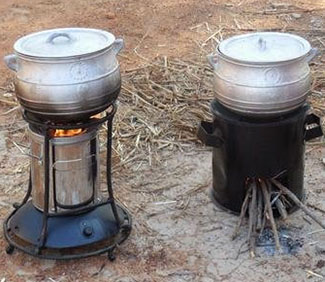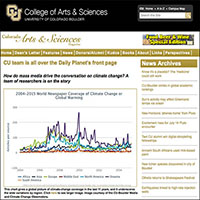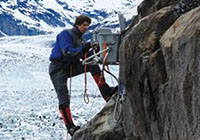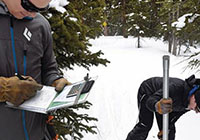Western Water Assessment NOAA grant recommended for funding for 5 years |
|
Deserai Anderson Crow 2015 Sabatier Award Winner for Best Conference Paper |
|
Degree in Three |
|
Environmental Brigades |
|
AAAS Workshop Competition |
The winners of the 2015 competition, Nicholas Valcourt and Thomas Reynolds, submitted the following reports about their experiences: “Overall, the experience of attending this workshop and the value of the information presented was an extremely beneficial opportunity for me as I look to further my aspirations of using fact-based, scientific information to support and advocate for issues relevant to my work and research. The lineup of speakers and panel topics proved to be a great introductory crash-course in science advocacy and lobbying. I think that the programming on a whole proved mutually beneficial to AAAS and the participants present and I would support others in my cohort who exhibit interest in advocacy and policy to apply for the workshop next year.” - Nicholas Valcourt (CU Civil Systems Engineering) “Participating in the 2015 Catalyzing Advocacy in Science and Engineering (CASE) workshop sponsored by AAAS was a great experience. The workshop greatly improved my understanding of and appreciation for the complex process by which our federal government funds science. Additionally, I have come to understand the necessity for scientists to advocate for science and the need for scientists to participate in the political process. Thanks to the efforts of AAAS and CU’s Office of Government Relations, I was given the opportunity to meet with staffers of senators and representatives from Colorado in order to gain hands on advocacy experience. Furthermore the opportunity to meet with other graduate students interested in science policy and learn about possible career opportunities was quite valuable. I am very thankful to CSTPR, the Center for STEM Learning, and the University of Colorado Graduate School for sponsoring my participation in the CASE workshop and I hope they are able to continuing sponsoring other CU students in the future.” - Thomas Reynolds (CU Chemical and Biological Engineering) |
Media and Climate Change Observatory (MeCCO) project highlighted |
|
Lisa Dilling and Max Boykoff op-eds in the Boulder Daily Camera |
|
Lisa Dilling and Max Boykoff had op-eds in the Daily Camera. Max’s op-ed, Leveraging media, social sciences, humanities in climate change debate, discusses his research findings that misperceptions about climate change, misleading debates and distractions can proliferate through the media and then prove detrimental to efforts to take action to mitigate carbon emissions or adapt to a warming world.
|
Roger Pielke, Jr. interview about FIFA scandal |
|



 The National Science Foundation (NSF) recently awarded Deserai Crow a 3-year grant for a project titled “Community Recovery and Colorado’s Extreme Floods of 2013: Policy Learning in the Context of Resources, Coalitions, and Political Conditions.”
The National Science Foundation (NSF) recently awarded Deserai Crow a 3-year grant for a project titled “Community Recovery and Colorado’s Extreme Floods of 2013: Policy Learning in the Context of Resources, Coalitions, and Political Conditions.”  The Western Water Assessment has been recommended for funding for another 5 years by the NOAA Regional Integrated Sciences and Assessment Program (RISA). WWA, which is within the Cooperative Institute for Research in Environmental Sciences (CIRES) at the University of Colorado-Boulder, addresses societal vulnerabilities related to climate, particularly in the area of water resources in Colorado, Utah, and Wyoming. WWA director Lisa Dilling stated she is “looking forward to another five years of innovative research, engagement with stakeholders, and rewarding interdisciplinary collaborations.” For more information visit the
The Western Water Assessment has been recommended for funding for another 5 years by the NOAA Regional Integrated Sciences and Assessment Program (RISA). WWA, which is within the Cooperative Institute for Research in Environmental Sciences (CIRES) at the University of Colorado-Boulder, addresses societal vulnerabilities related to climate, particularly in the area of water resources in Colorado, Utah, and Wyoming. WWA director Lisa Dilling stated she is “looking forward to another five years of innovative research, engagement with stakeholders, and rewarding interdisciplinary collaborations.” For more information visit the 

 For the second year, the Graduate Certificate Program in Science and Technology Policy at CSTPR organized a competition to select two CU-Boulder students to attend the AAAS “Catalyzing Advocacy in Science and Engineering” workshop in Washington, D.C. There they learned about Congress, the federal budget process, and effective science communication, and met with their Members of Congress and congressional staff. The competition is supported by the
For the second year, the Graduate Certificate Program in Science and Technology Policy at CSTPR organized a competition to select two CU-Boulder students to attend the AAAS “Catalyzing Advocacy in Science and Engineering” workshop in Washington, D.C. There they learned about Congress, the federal budget process, and effective science communication, and met with their Members of Congress and congressional staff. The competition is supported by the 


